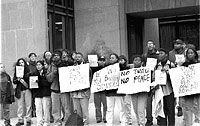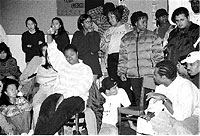

 Hanna Miller
Hanna Miller
Charlene Cole-Newkirk, dean of Student Life and Services, resigned from her position October 13. The resignation was effective immediately.
Cole-Newkirk, OC '74, first arrived at Oberlin College as a transfer student looking for a more progressive environment. After a 20-year absence from the College, Cole-Newkirk returned in 1995 to succeed Patrick Penn.
Cole-Newkirk was lauded for her contributions to the Multicultural Resource Center and the Office of Safety and Security. In two years, however, Cole-Newkirk had cultivated more than her share of detractors. Rumors concerning Cole-Newkirk's use of money and hiring practices were widely circulated.
Students rallied against Cole-Newkirk after she evicted junior Matt Holford from South Hall for possessing illegal drugs. Staff members, however, were more concerned with administrative infractions, including deleting sections from the Rules and Regulations Handbook. Cole-Newkirk repeatedly violated standard hiring procedures.
In October 1996, a search committee for the new associate dean of Student Life position unanimously threw their weight behind candidate Bill Stackman. Cole-Newkirk offered the job to Mark Constantine, explaining she didn't believe the search committee had a strong preference.
In 1997, Director of Career Services Lanna Hagge resigned after 22 years largely because of personal conflicts with Cole-Newkirk. The relationship between Cole-Newkirk and Hagge deteriorated when Charles Newkirk, Cole-Newkirk's husband, applied for a position in the Office of Career Services. Charles Newkirk was accused of harrassing secretaries in the Office of Career services during the application process. Cole-Newkirk denied the allegations.
When asked to comment in September, Charles Newkirk said, "I would advise you to get a life. I suggest you pull your head out of your ass and quit playing your fucked up racist games."
Although Cole-Newkirk had managed to weather the storms that clouded her career at Oberlin, things began to unravel in September. Students returning to Oberlin were shocked to discover Cole-Newkirk had fired Director of Residential Life and Services Deb McNish in June 1997. Cole-Newkirk informed McNish the firing was unrelated to job performance.
"I think that causes a certain amount of concern," Associate professor of politics Chris Howell said in September. "It doesn't make sense to lose your job because you don't get on with your boss."
Associate Dean of Students Yeworkwha Belachew took a medical leave of absence soon after McNish was fired. Sources close to the administartion said Belachew was emotionally distressed by the situiation.
The departure of Belachew and McNish, two extremely popular administartors, led to the organization of a student forum with Cole-Newkirk.
Students and administartors packed King 106 to participate in the open forum. Students holding placards in support of Cole-Newkirk lined the walls. Although Dye had declined to participate, citing a schedule conflict, she too sat in King 106. She did not join Cole on stage, but instead sat among the students.
"We need to address frictions," senior Nikka Pierce said at the forum. "I want to know how many times you've met with other student groups besides Abusua?"
Discussion at the forum ranged from the upkeep of program houses to the firing of McNish.
"This is the first time I've ever encountered anything like this in my life," Cole-Newkirk said at the forum. "I've never seen it before. I think every institution needs a scapegoat and I'm it."
The resignation
Although things didn't seem to be going well for Cole-Newkirk, students and staff members alike were surprised by her sudden departure. Many students said they were frustrated by the unavailability of specific details of Cole-Newkirk's resignation. Dye repeatedly said she was unable to comment on the circumstances surrounding the resignation.
"It is wildly and totally inappropriate for me to talk about issues being raised because they are by nature confidential and private," Dye said.
Cole-Newkirk declined to be interviewed.
Cole-Newkirk announced her resignation to Dye at their weekly Monday meeting. According to the associate deans of Student Life and Service, Cole-Newkirk had not indicated she had any intention to resign.
"I was surprised," Director of Security Keith James said. "I'm sure that wasn't a unique reaction."
"It was pretty much unexpected by everyone," Assistant Director of the Student Union Chris Baymiller said. "It looked like she was weathering the storm in the open forum in King."
"This might have been expected some time ago," acting director of Residential Life Barb Mehwald said. "I thought we'd turned a corner."
"My feeling is Charlene recognized that her position was just no longer tenable here," Howell said.
"I fault President Dye for failing to demonstrate leadership in this regard," Professor of Theater Roger Copeland said. "Why was she one of the last to concede what a disastrous appointment this was? A vast amount of suffering could have been avoided if Dye had acted earlier."
"As a friend, I would have known," Associate Dean of Students Ken Holmes said. "I didn't know."
According to Holmes, he and Cole-Newkirk were discussing a diversity program on Monday afternoon. Cole-Newkirk left at 2 p.m. to meet with Dye.
"She said 'Okay, I'll be back,'" Holmes said. Holmes said after Cole-Newkirk left the office, he created a catchy title for the program and awaited her return.
"She was gone maybe 10 minutes and back," Holmes said. "I'm sitting here and she walks in and says she's no longer dean. She said 'I guess I need to tell the secretaries.' She didn't look upset. She wasn't crying. She said, 'I'm going home.' Honestly, we were all in shock."
Dye said she was surprised Cole-Newkirk resigned so abruptly. "I did not expect Charlene to leave on Monday," Dye said.
In a meeting with students, Dye said, "Did I ask her to go back to the office and leave? The answer is no."
"My understanding was that it was Charlene's decision to do this quickly," Howell said. "It was thought she'd stay until perhaps the end of the month, or at least through fall break."
"I didn't think it would come to this," Holmes said.
Cole-Newkirk asked Associate Dean of Student Life and Services Bill Stackman to contact Dye to arrange a meeting with the division.
"When we met with Dye, she said Cole tendered her own resignation," Baymiller said. "We were told she felt very good about it and was in fact relieved."
Some students who learned of Cole-Newkirk's resignation attempted to gain admittance to the meeting Dye held with staff. Dye agreed to discuss concerns with students after her meeting with staff. Students also arranged an open meeting with Dye at Afrikan Heritage House.
Concerns
Many students who attended the meetings with Dye suggested Cole-Newkirk's resignation reflected a pattern of racism at Oberlin.
"I think we need to question that Dean Cole is the fifth or sixth person of color to leave since I've been here," senior Andrea Clarke said. "We seriously want answers about why people of color don't feel comfortable staying here."
Approximately 30 concerned students and Student Life and Services' staff met with Dye in the open forum. Students asked questions about the circumstances surrounding Cole-Newkirk's resignation and expressed anger, hurt and a sense of institutional betrayal over Cole-Newkirk's departure. The tense discussion, which ran for over an hour, was punctuated by occasional outbursts of tears. Through it all Dye maintained that she was sorry, and through it all, the students maintained that hearing Dye tell them that she was sorry wasn't good enough.
Dye was unable to discuss the reasons that led to Cole-Newkirk's departure.
"Obviously, in a way I'm not being responsive," Dye said. "These are not public issues."
"I want to convey one thing," Director of Human Resources Ruth Spencer said. "Administrative decisions are always very complex and multi-faceted."
Junior Belice Cabrera asked Dye to explain what role the Board of Trustees play in determining hiring and firing at the College. Cabrera suggested that trustees were responsive to the concerns of wealthy white students who did not like Cole-Newkirk but contributed a lot of money to the College.
"The white community has a lot of money," Cabrera said. "People of color don't have a lot of money."
"The College is not run to make any sort of preferential treatment," Dye said. "There are no decisions made on the basis you just suggested."
"You have to excuse me," Cabrera said, as she began to cry and another student rushed to hug her. "I'm very hurt. You know that, right? We're all very hurt."
Senior Melody R. Waller asked Dye, "What are you going to do? We've talked prettily for two hours and no-one's had any questions answered. As president, what are you going to do to keep black people here?" Waller asked.
Dye said, "I know you're mad at me and I understand that, but there's no way I can defend myself, all I can say is that I feel very deeply."
"Since I've been here I've seen too many people disappear," said sophomore Robyn Brazeal. "Where can I look for support? They're all gone. The only person I have left is Ken. There ain't no telling when he's going to leave."
"I don't plan on leaving," Holmes said in October. "It would really concern me if there was a mass exodus of staff of color. I'll have to be a special support. Cole's shoes will be hard for me to fill."
Holmes announced his resignation this month.
The aftershocks
The palpable anger expressed at the forums with Dye culminated in the year's largest student protest. The rally, organized by a loosely-formed group known as 'The Coalition,' attacked institutional racism and sexism. The Coalition had a series of meetings after the protest, but interest flagged quickly.

On October 16, some people congregated on Mudd Ramp. Then a few more people joined. The chanting started. "No Justice, No Peace." High above, several women poked their heads out of the windows of Warner to add their cries. "No Justice, No Peace."
By early afternoon, 40 people had gathered in front of Mudd to demonstrate for attention to the needs of under-respresented communities at Oberlin.
"If you agree with what we're saying, come join us," said senior Rich Santiago. "If you don't understand, ask questions." Some students crossed over from the crowd of on-lookers to join the group of protestors at the base of the ramp.
Junior Bobbi Lopez was among the demonstrators. "I'm here because I want to be united," Lopez said. "It's not about Charlene Cole, it's not about Deb McNish."
"This is to show that people from different backgrounds can come together and voice what they believe in," said sophomore Javiela Evangelista, who periodically left her position in the orderly march to hand fliers to passsers-by. "It's for everyone. We need to take responsibility."
The demonstration then moved south to the Conservatory where the protestors entered the library. The beat of the protest permeated the room, causing students hunched over in listening carrells to remove their headphones and stand up to see. The rhythym proved contagious, as library staff started to stomp their feet and clap their hands along with the protestors.
Double-degree fifth-year Mirna Valerio was working behind the circulation desk. Valerio leaned far over the desk and exclaimed, "This is great, it's wonderful. I'm so happy. They're doing it and disrupting the peace we think we have at Oberlin."
The protest moved quickly across Tappan Square to the Admissions Office. Amid the Change the World viewbooks, the demonstrators continued their cries. Christopher Gatzke was visiting Oberlin from Circleville, Ohio. Gatzke's father, who sat beside his son in the lobby of the admissions office, professed that most of the controversy in Circleville centered around who grew the biggest vegetables that year. Gatzke was surprised by the demonstration.
"I've never seen that kind of rally before," he said. "As long as they're making their cause known, it's real positive."
Martha Lermond, Chemistry lab manager, stood in the hallway, shaking her head as the protest moved through Kettering.

"This is a terrible disturbance," Lermond said. "I have no idea what they're saying because they're making such a racket. I'm concerned about students doing difficult math. They're trying to do chemistry problems now. Did Farrakhan call for this?"
As the protest wound past labs, students in lab coats and rubber gloves appeared at the doorways to hug the protestors and clap their hands. "I wish I could be with them," said one student who was busy dissecting a cat when the sounds of the demonstrators' chants wafted through the classroom. "This is all the support I can give," she said as she clapped along.
"The presence of people of color on campus is so strong now," Waller said. "No one can ignore us."
Cole-Newkirk's settlement and the future of the division
In the wake of Cole-Newkirk's resignation, Dye declined to name an acting dean to assume the position vacated by Cole-Newkirk. Dye asked Assistant to the President Diana Roose to help coordinate the division during the interim.
"It is, admittedly, unconventional." Dye said of the arrangement. "But sometimes unconventional measures work best. This gives the division a chance to take a deep collective breath and say 'Where do we go from here?," Dye said.
Roose coordinated the divsion until this week. On Thursday, Dye announced that McNish had been named Acting Dean of Student Life and Services.
Cole-Newkirk settled with the College in Janauary for an undisclosed amount. In October, Dye categorically denied rumors that Cole-Newkirk had negotiated to receive a $1 million severence package.
"It's one of the silliest things I've ever heard at Oberlin," Dye said. "That's absurd. Just absurd."
College attorney Michael Fransz said, "Both parties were able to resolve things amicably. It was a very standard agreement."
Former Dean (above): Charlene Cole-Newkirk started her position as Dean of Student Life and Services in the fall semester of 1995. (file photo)
Voicing dissent (middle): About 40 students gathered on Mudd ramp of Cole-Newkirk's resignation to protest the administration's lack of support for minority administrators, students, and staff. (photo by Laren Rusin)
Addressing concerns (below): An open forum for students was held in Afrikan Heritage House soon after Cole-Newkirk resigned. The Coalition, an ad hoc collective of student groups, formed from this and later meetings. (photo by Laren Rusin)
Copyright © 1998, The Oberlin Review.
Volume 126, Number 24, May 22, 1998
Contact us with your comments and suggestions.